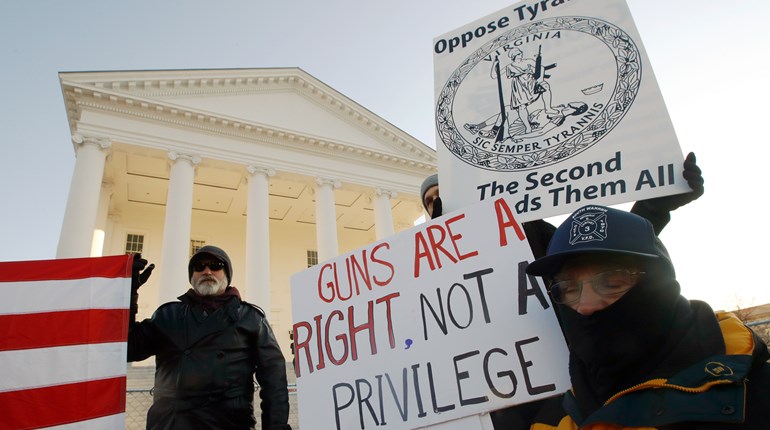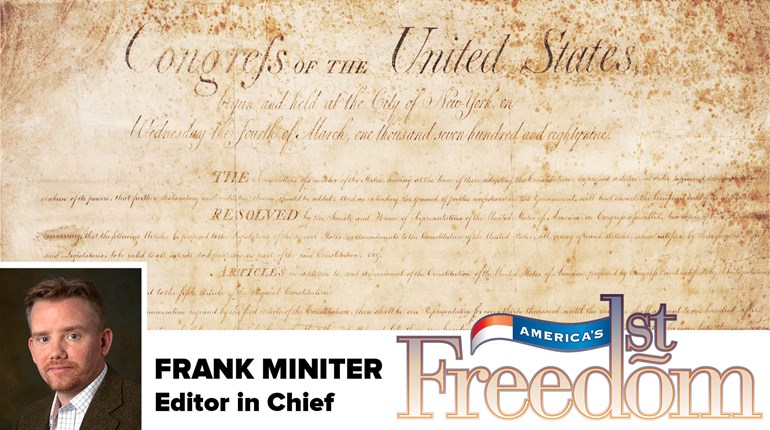
Ronald Reagan once warned that “freedom is never more than one generation away from extinction.” Because we cannot “pass it on to our children in the bloodstream,” he said, we must “hand it to them with the well-thought lessons of how” they can “fight for it, protect it [and] defend it,” so that they, too, can pass it on to the next generation.
Tragically, our work—one of us as a law professor and one a constitutional lawyer—has shown us that the values of a free society—the rule of law, self-determination, tolerance and accountability, to name a few—are in some disrepair.
Several influential forces, including many educators and members of the media, have taught recent generations that freedom is not always worth defending; instead, they maintain that even our right to self-preservation, via our Second Amendment rights, is just another antiquated value to be sacrificed for notions of security, equity and statism.
Thus, it is more important than ever to ensure that the young people in our lives are taught the fundamentals of American freedom. To that end, here are 10 lessons that all Americans should know about their rights.
 1. We all have natural rights, which are granted by our Creator, not our government.
1. We all have natural rights, which are granted by our Creator, not our government.
Everyone is born with natural rights, which are inherent in all of us simply because we are human. These universal and immutable rights include life, liberty, free speech, freedom of conscience, the right to self-defense and the right to property, among others. Everyone is endowed with natural rights regardless of race, religion, class or other category. As George Mason put it: “All men are born equally free and independent, and have certain inherent natural rights, of which they cannot by any compact deprive or divest their posterity.”
2. Our government exists to protect our natural rights.
The Declaration of Independence famously declares that “all men are created equal” and are “endowed by their Creator with certain unalienable Rights,” such as “Life, Liberty and the pursuit of Happiness.” It is “to secure these rights,” that “Governments are instituted among Men, deriving their just powers from the consent of the governed.” So, our government exists to protect our rights, and must protect everyone’s rights equally. Moreover, far from a government that grants rights to the people it governs, it is the American people, through “the consent of the governed,” that grants the government its powers. And not any powers—only “just powers.” Such powers do not include the authority to infringe on natural rights, even if a majority of the people consent. That is clear because the whole purpose of government is to “secure these rights.”
 3. The U.S. Bill of Rights codified preexisting rights.
3. The U.S. Bill of Rights codified preexisting rights.
The Second Amendment codified a right that already existed—the Second Amendment’s text does not create a right, but instead declares that the preexisting natural right “shall not be infringed.” Thus, as the U.S. Supreme Court has recognized, this “is not a right granted by the Constitution. Neither is it in any manner dependent upon that instrument for its existence.” Consequently, repealing the Second Amendment would accomplish little under the original understanding of the American system of government. That said, there is no doubt that the goal of the anti-rights movement is to disregard the original understanding of rights in America, repeal the Second Amendment and eliminate gun ownership; as a result, despite the preexisting nature of the right, we can never relent in our fierce defense of it. The same applies to the rest of the U.S. Bill of Rights, including parts that are less important to us individually.
4. The Constitution is an anti-majoritarian document.
The purpose of a constitution is to restrain government from imposing a “tyranny of the majority,” which, according to philosopher John Stuart Mill in his famous work, On Liberty, “operat[es] through the acts of the public authorities.”
Legislatures are particularly susceptible to majoritarian pressures because they are elected and responsible for making (rather than enforcing) laws. In James Madison’s words from Federalist No. 10, the Constitution ensures that government cannot serve “the superior force of an interested and overbearing majority” at the expense of the rights of the minority. Whether the right protected is equal protection, unpopular speech or the right to keep and bear arms, as the U.S. Supreme Court said in District of Columbia v. Heller (2008), “the enshrinement of constitutional rights necessarily takes certain policy choices off the table.”
 5. No one—judges or otherwise—should rank rights.
5. No one—judges or otherwise—should rank rights.
Rights are valuable for their own sake. Ranking them is necessarily a majoritarian act because it requires making a policy choice about whether one right is more valuable than another. Whenever rights are chosen for special (or especially bad) treatment by the legislative, judicial or executive branch, the result will be that disfavored groups—those wishing to exercise disfavored rights—will be on the losing end of any government-decreed rights hierarchy.
6. If the Constitution doesn’t mean what it was meant to say, it doesn’t mean anything.
If judges have license to enforce their (or what they perceive to be society’s) norms when interpreting the U.S. Constitution, it can no longer serve as an effective constraint on government or the majority.
Take the 1934 case of Home Building & Loan Association v. Blaisdell, in which the plaintiff challenged a Minnesota law creating a moratorium on mortgage foreclosures. Plaintiff brought its claim under the Contracts Clause of the U.S. Constitution, which declares that “No State shall ... pass any ... Law impairing the Obligation of Contracts.” The U.S. Supreme Court acknowledged that evidence presented in the case showed that it was this type of debtor-relief legislation that the Contracts Clause intended to prohibit. Nevertheless, it upheld the law, declaring: “It is no answer to say ... that what the provision of the Constitution meant to the vision of [the Founding] it must mean to the vision of our time.” In other words, the Court said that the Contracts Clause did not today prohibit the very government action that it was intended to prohibit when it was enacted. It is difficult to see how the Clause could mean anything under such a reading.
 7. For more liberty and better representation, most decisions should be made at the state and local levels.
7. For more liberty and better representation, most decisions should be made at the state and local levels.
The American system of government is designed to ensure that the decisions impacting your life are made as locally as possible. Thomas Jefferson argued that “generalising & concentrating all cares and powers into one body ... has destroyed liberty and the rights of man in every government which has ever existed under the sun.” Thus, Jefferson explained, “the way to have good and safe government, is not to trust it all to one [central government]; but to divide it among the many.” “[I]t is by dividing and subdividing these republics from the great National one down thro’ all its subordinations, until it ends in the administration of every man’s farm and affairs by himself ... that all will be done for the best.”
The more centralized government power becomes, the less representative it can be of a diverse people. This is harmful to individual liberty and unity among the states. According to Jefferson’s vision of the Constitution, “our General Government may be reduced to a very simple organization, and a very inexpensive one; a few plain duties to be performed by a few servants.”
In Federalist No. 45, Madison explained how this principle applies to the Constitution’s balance between state and federal power. While the “powers delegated by the proposed constitution to the federal government, are few and defined,” those that “remain in the state government, are numerous and indefinite.” While federal powers “will be exercised principally on external objects, [such] as war, peace, negotiation, and foreign commerce,” the “powers reserved to the several states will extend to all the objects, which, in the ordinary course of affairs, concern the lives, liberties, and properties of the people; and the internal order, improvement, and prosperity of the state.” Therefore, “[t]he operations of the federal government will be most extensive and important in the times of war and danger; those of the state governments in times of peace and security.”
The federal government has grown far beyond what the Founders envisioned. Its operations are extensive during times of peace and security, and they affect countless aspects of our daily lives. The larger the federal government becomes, the less liberty each American has, because the government’s power—its ability to restrict or require certain behaviors—necessarily comes at the expense of individual choice.
 8. We have equal rights, which is not, and should not be, a guarantee of equal results.
8. We have equal rights, which is not, and should not be, a guarantee of equal results.
A central purpose of our government is to ensure equal treatment under law, regardless of occupation, gender, race or religion. This does not, however, translate to equal results. Individuals have different skills, motivations, goals and values. They will inevitably reach different outcomes in a free society, even when they receive equal treatment. Thus, Alexander Hamilton explained that “inequality would exist as long as liberty existed, and that it would unavoidably result from that very liberty itself.” It is government’s role to protect individuals’ rights so that they may pursue happiness; it is not government’s job to guarantee success in achieving it.
9. The Constitution is a tyranny-control document.
The United States government was not established by a conquering army, dictator or emperor for the purpose of retaining authority over the people it rules. George Washington led America in defeating a tyrant, and—to much of the world’s surprise—he sent his army home and resigned his military commission when the War for American Independence ended. He did not want to be president, though some people were actually willing to make him king. But what of future governments?
America’s Founders, being students of history, were acutely aware of the long history of governments turned despotic, as well as the ability of power to corrupt. They therefore built a constitution that made it more difficult for the government to turn on its people. Structural limits on government, like separation of powers among the branches of government and the division of power between federal and state governments, ensure that it is difficult for power to coalesce in one place. Individual rights—like the right to speak freely in criticizing the government, the right to bear arms, the right to a jury trial and prohibitions against bills of attainder (which prevents legislatures from declaring someone a criminal) —protect individuals from overbearing government behavior and enable them to counteract it.
 10. The American system of government calls for the resistance to tyranny.
10. The American system of government calls for the resistance to tyranny.
Fortunately, America’s founders erected bulwark upon bulwark against tyranny. But when all else fails, the Declaration of Independence makes clear that “whenever any Form of Government becomes destructive of [inalienable rights], it is the Right of the People to alter or to abolish it, and to institute new Government.”
This echoed both John Locke and George Mason, who inspired Jefferson. Locke argued that by violating natural rights, government officials “forfeit the power the people had put into their hands and it devolves to the people, who have a right to resume their original liberty” and instate a new government.
Likewise, The Virginia Declaration of Rights, drafted by George Mason, provided that the people have “an indubitable, inalienable, and indefeasible right to reform, alter, or abolish” a government that fails to serve and protect the people.
Yet common sense, and history time and again, prove that this last resort is available only where the people are armed. As former Judge Alex Kozinski of the U.S. Court of Appeals for the Ninth Circuit said, the “simple truth—born of experience—is that tyranny thrives best where government need not fear the wrath of an armed people. Our own sorry history bears this out: Disarmament was the tool of choice for subjugating both slaves and free blacks in the South ... .
“All too many of the other great tragedies of history—Stalin’s atrocities, the killing fields of Cambodia, the Holocaust, to name but a few—were perpetrated by armed troops against unarmed populations.”
Judge Kozinski then calls the Second Amendment a “doomsday provision, one designed for those exceptionally rare circumstances where all other rights have failed.”
This is an extreme that should never be allowed to happen. A key to preventing such an extreme is having an armed populace who, by being armed, act as a deterrent to tyranny.
George A. Mocsary is a professor of law at the University of Wyoming College of Law and adjunct scholar at the Firearms Policy Coalition. Joseph Greenlee is the director of constitutional studies at the Firearms Policy Coalition.
































